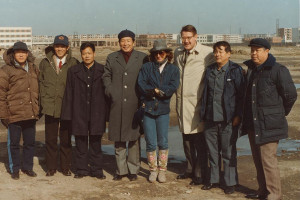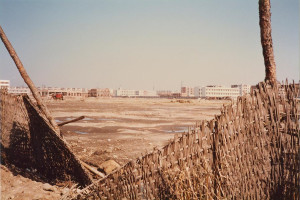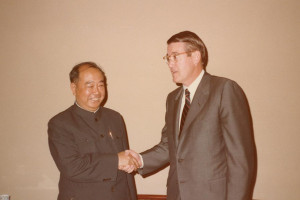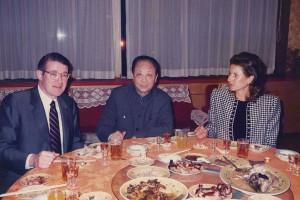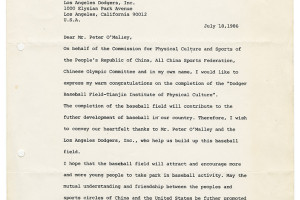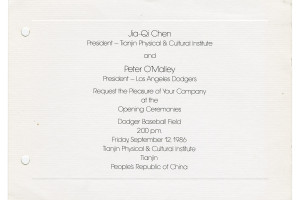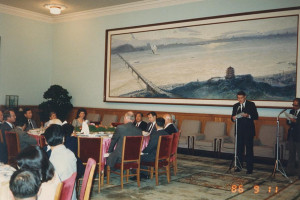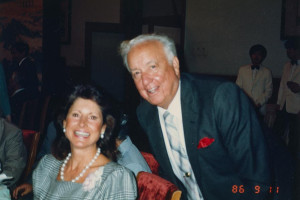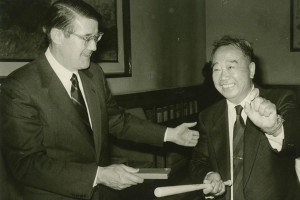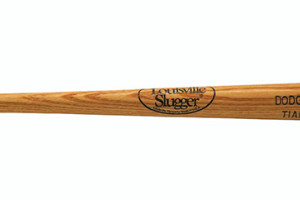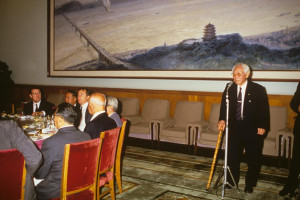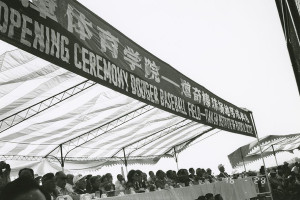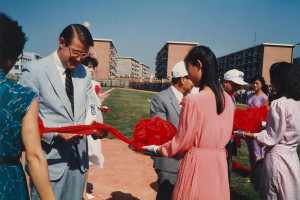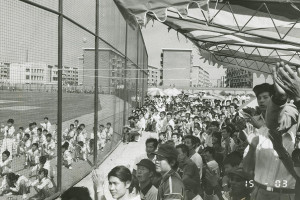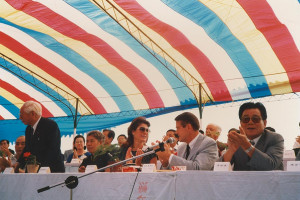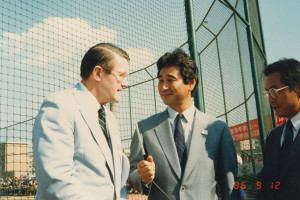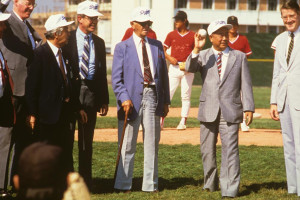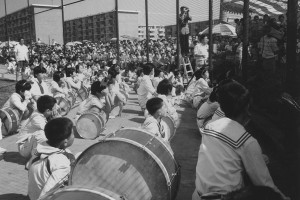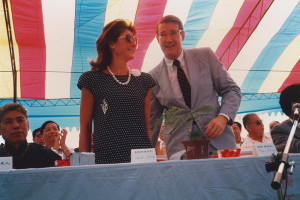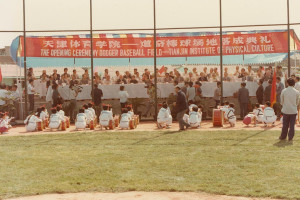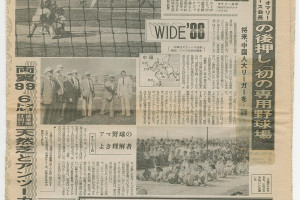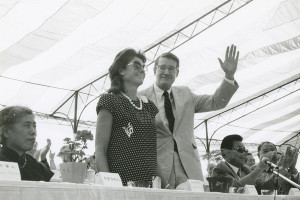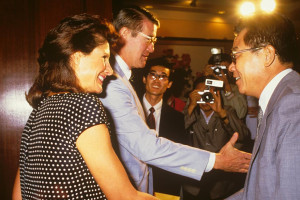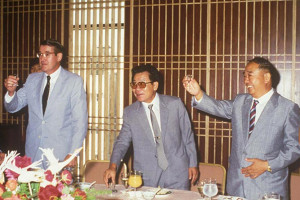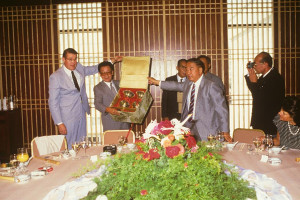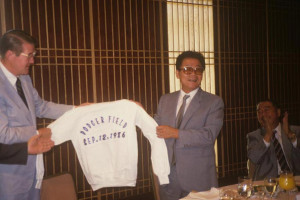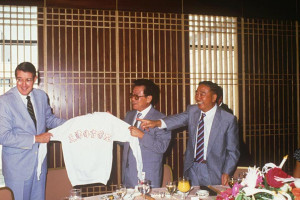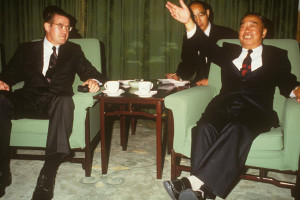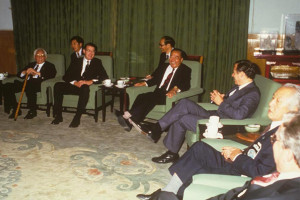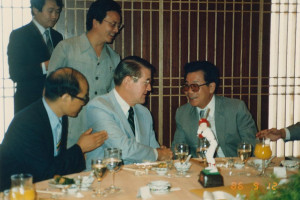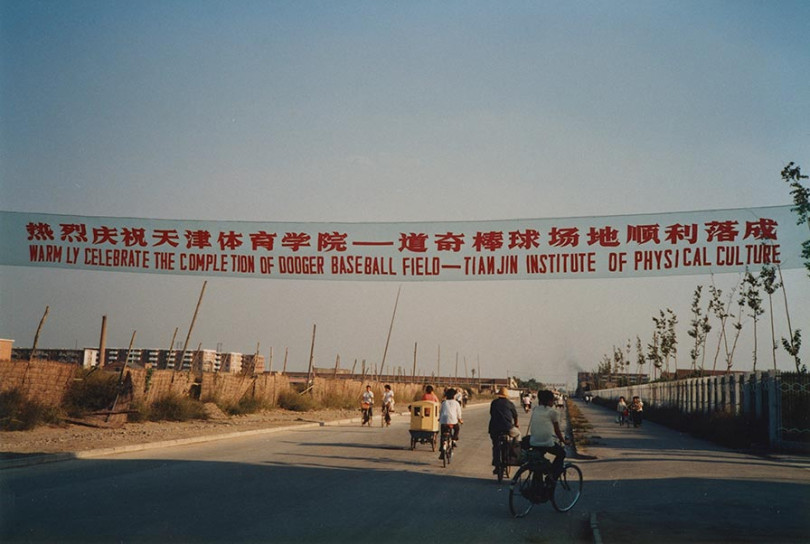
A large banner crosses the street to celebrate the Grand Opening of Dodger Baseball Field at Tianjin Institute of Physical Culture, Tianjin, People’s Republic of China, on September 12, 1986. Dodger President Peter O’Malley privately built China’s first field solely dedicated to baseball.
Baseball Field in the People's Republic of China? Yes, the First
By Brent Shyer
How does one go about trying to build a baseball field in a foreign country? And, oh by the way, it would be the first one ever built dedicated to the sport. In addition, this happened 38 years ago!
The journey started quietly enough. Dodger President Peter O’Malley had the idea of helping the People’s Republic of China to develop baseball. He wrote a January 16, 1980 letter to Bill Arce, Claremont (CA) Men’s College baseball coach, who became the first American coach to visit China in an official capacity to offer baseball instruction. “I would like to visit China some day. If you happen to meet someone there who would be in a position to facilitate this, I would be very grateful. It is quite likely that my visit there could result in an invitation to be extended to the proper people to visit Dodgertown, Vero Beach, Florida, in the spring of 1981 to observe our coaching and teaching methods, etc.” Peter O’Malley letter to Bill Arce, January 16, 1980
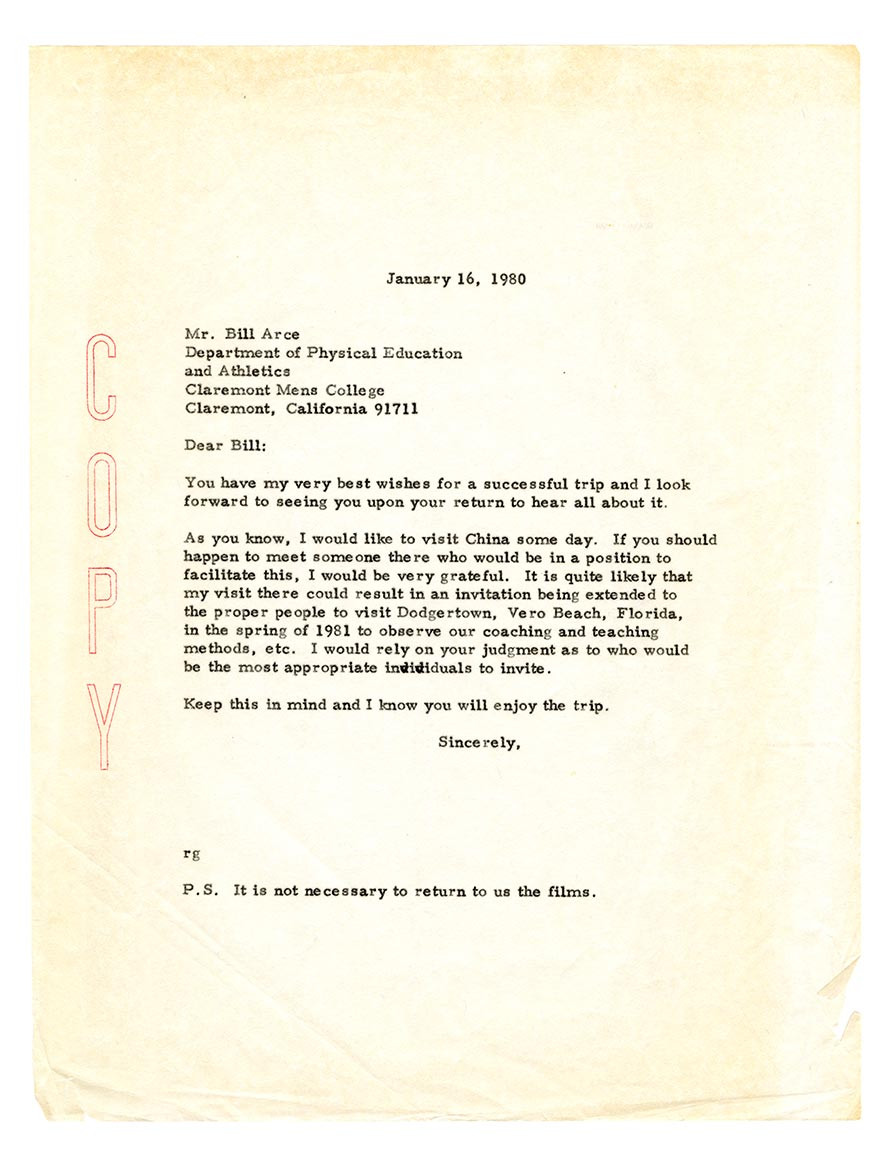
January 16, 1980
On January 16, 1980 Dodger President Peter O’Malley writes to Bill Arce, head baseball coach of Claremont Men’s College and a pioneer internationally to ask about possible introductions to sports officials in the People’s Republic of China. This letter begins a relationship O’Malley has with sports officials in China and eventually leads to O’Malley building a regulation baseball diamond in Tianjin in 1986.
With Arce’s assistance, the next month O’Malley and his wife Annette made a three day visit to China from February 14-16, 1980. O’Malley met with All-China Sports Federation members and he wrote Baseball Commissioner Bowie Kuhn, “Our brief trip to Peking (Beijing) was a big success and I will be giving you all the details.” Peter O’Malley letter to Baseball Commissioner Bowie Kuhn, February 19, 1980 Peter’s first trip to the People’s Republic of China came on the heels of just completed important meetings in Nagasaki, Japan to see a 1/30th scale model demonstration of the Mitsubishi Diamond Vision technology for large, full-color video screen displays. In other words, this was just another week in the so-called “off-season” baseball life of O’Malley.
The world would be focused on Dodger Stadium, Los Angeles on July 8, 1980, as the Dodgers would host the Major League Baseball All-Star Game. The Diamond Vision technology was so cutting edge and exciting, O’Malley seized the opportunity to install and debut the world’s first, full-color massive 35 x 25’ video screen at the All-Star Game.
This would be a new way for fans in the stands to be entertained – a game-changer which revolutionized live sporting events. The China meeting would have further international baseball ramifications, leading to additional dialogue and exchanges, including O’Malley hosting top representatives of All-China Sports Federation to observe baseball at Dodger Stadium during late July-August, 1980.
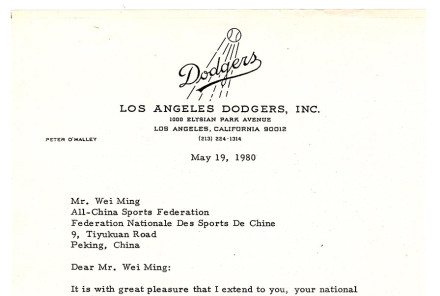
A May 19, 1980 letter from Dodger President Peter O’Malley inviting Wei Ming of the All-China Sports Federation in the People’s Republic of China to meet with him and to watch games at Dodger Stadium. It is the first time Chinese sports officials have been invited to the U.S. to see Major League Baseball.
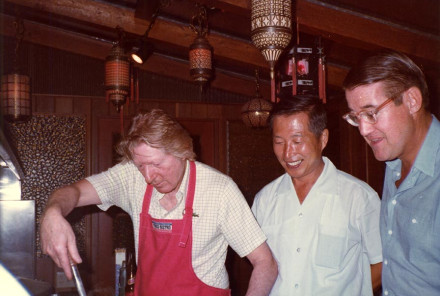
On August 3, 1980, world-renowned entertainer Danny Kaye (left) in his gourmet kitchen at home as he prepares a meal for some All-China Sports Federation leaders from the People’s Republic of China, including Xie Lang (center), along with Dodger President Peter O’Malley. Kaye, who was a well-known chef of Chinese cuisine, met the group at Dodger Stadium and invited them to his home for a Chinese dinner.
Five representatives, including three baseball coaches and two high-ranking officials – Xie Lang and Liu Juechon – of the federation, spent two weeks in Southern California and they got their own peek at the innovative Diamond Vision video board. They were also introduced at Dodger Stadium to O’Malley family friend and world-renowned entertainer Danny Kaye, who invited the group to his home for dinner. As a famous chef, Kaye hosted the traveling party with O’Malley and personally prepared in his gourmet kitchen a Chinese dinner.
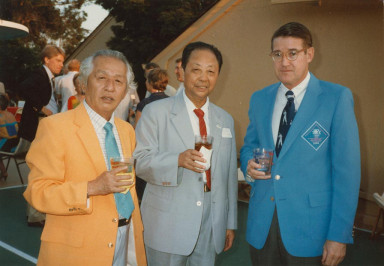
(L-R): Eiichiro Yamamoto, of Japan and President of the Baseball Federation of Asia; Wei Ming, President of the Chinese Baseball Association; and Peter O’Malley at the 1984 Olympic Baseball reception in Los Angeles. Ming was an important ally for helping baseball to develop and grow in China. Yamamoto started in baseball as an umpire in 1951 and served as a commentator for baseball for NHK TV. He was an essential supporter of Olympic Baseball in the earliest days with O’Malley and his counsel and advice were instrumental in persuading others to the goal. For his leadership, Yamamoto was elected to the Japan Baseball Hall of Fame in 1997.
During the 1984 Games of the XXIII Olympiad in Los Angeles, baseball was one of only two demonstration sports (tennis was the other) approved by the Los Angeles Olympic Organizing Committee and International Olympic Committee (IOC). O’Malley, who with other international baseball leaders, had advocated the inclusion of baseball for the 1984 Olympic Games and beyond on a permanent basis, hosted the eight-team exhibition tournament at Dodger Stadium to sold out crowds. The excitement and buzz created from that experience put baseball on the global radar for future Olympics.
During the 1984 Olympic Baseball tournament, O’Malley invited friends from the People’s Republic of China, including the high-ranking Li Menghua, Minister of Sports and one of the leaders of the nation’s governing body, and Wei Ming, President of the Chinese Baseball Association as well as in charge of all sports in Beijing to sit with him for games. Joining them in the President’s Box were Baseball Commissioner Kuhn and Rod Dedeaux, legendary University of Southern California head baseball coach and USA Olympic Baseball head coach, on days when the USA team was not competing in the tournament. Dr. Shigeyoshi Matsumae, Founder and President of Tokai University, Tokyo was another of O’Malley’s special guests who sat with him for games.
It was the second consecutive year that Dr. Matsumae had visited with O’Malley and Dodger Assistant to the President Akihiro “Ike” Ikuhara for Dodger games, as he was also at Dodger Stadium on June 14, 1983. Matsumae was interested in unifying countries through sport and expressed to O’Malley his dream of privately financing a baseball field in Russia, which would be a first. That idea planted a seed with O’Malley, inspiring him to consider building a baseball field in the People’s Republic of China.
More friendly discussions took place in the fall of 1984, when O’Malley was invited back to China to meet with All-China Sports Federation leaders. To continue the relations, O’Malley sent Dodger minor league manager Kevin Kennedy and scout Tim Johnson to China for two weeks in December, 1984 to hold a series of baseball instructional clinics in Kunming. Both Kennedy (Texas, Boston) and Johnson (Toronto) later managed in the major leagues.
Kennedy wrote in a column, “Baseball was just a demonstration sport at the Olympics then, and Mr. O’Malley had spoken with a member of the sports federation in China. They wanted to be able to send a competitive team to the Olympics, so in the winter of 1984 Tim and I went over to the mainland and became the first American coaching professionals to hold baseball clinics there. China did indeed become competitive.” Kevin Kennedy, Fox Sports, msn.foxsports.com, January 20, 2006
In 1985, O’Malley made two important trips to China with great assistance from Cai Jizhou, Vice President, China Baseball Association.
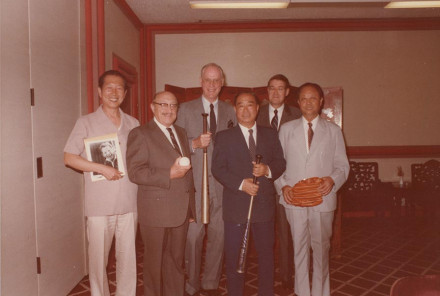
(L-R): Xie Lang, leading member of the competition department of the All-China Sports Federation responsible for baseball, People’s Republic of China; Dr. Leonard Milton; Baseball Commissioner Bowie Kuhn; Li Menghua, Minister of Sports, People’s Republic of China; Dodger President Peter O’Malley; and Wei Ming, President of China Baseball Association. O’Malley traveled to Beijing, China from June 5-9, 1985, along with Commissioner Kuhn to help plan possible baseball projects, including development and building a field.
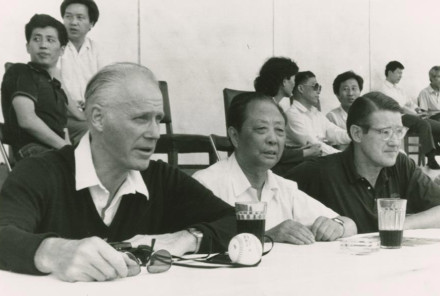
(L-R): Bowie Kuhn, Hall of Fame Baseball Commissioner; Wei Ming; Chairman, China Baseball and Softball Federation; and Peter O’Malley, Dodger President in Beijing, People’s Republic of China, June 9, 1985. O’Malley and Kuhn watch an exhibition game between New York’s C.W. Post College and Sichuan Province in Beijing. O’Malley was interested in helping to develop baseball in China with plans to privately build its first field dedicated to baseball. Kuhn was elected to his position in 1969 and served through the 1984 season. He was an involved supporter of international baseball and encouraged all of baseball to get behind the idea of baseball as a gold medal sport in the Olympic Games.
Kuhn, who had been Baseball Commissioner for 15 years and completed his term in 1984, and O’Malley were in Beijing from June 5-9, 1985 to watch an exhibition baseball game between New York’s C. W. Post College and Sichuan Province. At the time, O’Malley said, “I just want to help the Chinese develop baseball any way I can.” Associated Press, June 11, 1985 He and Kuhn also discussed “ballpark planning” with the representatives of China Baseball and Softball, including Wei Ming, president of the association. Ibid.
Just prior to O’Malley returning to China in November, 1985 to scout out baseball field locations and decide upon one, he wrote a letter of encouragement to Dr. Matsumae on November 6, 1985: “It seems to me that now is the perfect time to build a baseball field in Russia and I am anxious to discuss this long time dream of yours with you.”
Several days later, O’Malley and his assistant Ikuhara were in Dr. Matsumae’s Tokyo office to inform him of O’Malley’s plan to privately build a baseball field in China. Kim Palchikoff, New York Times, July 24, 2001
O’Malley explained: “China was important in the International Olympic Committee community and I wanted China to realize that they had a baseball friend in the United States who was willing to help them develop baseball. Ike and I made several trips to China considering different locations for the field and finally selected Tianjin Institute in Tianjin.” Akihiro “Ike” Ikuhara biography, Nobishisa Ikuhara, 2013
O’Malley told Dr. Matsumae that he had identified a site for the baseball field in Tianjin, a coastal city about 75 miles southeast of Beijing. On November 21, 1985, O’Malley wrote in a letter to Kuhn: “I am happy to report that my trip to China was a big success. We have agreed on a site for the baseball field and it will be built at the Tianjin Physical & Cultural Institute in Tianjin.” Peter O’Malley letter to Bowie Kuhn, November 21, 1985 The Institute was established in 1958 to aid Physical Education teachers from the northern part of China.
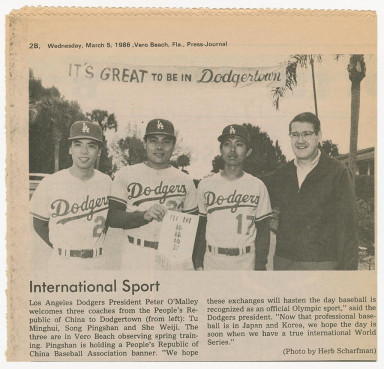
Clipping from the Vero Beach Press Journal, March 5, 1986, showing Dodger President Peter O’Malley greeting three coaches from the People’s Republic of China to Dodgertown, Vero Beach, Florida to observe spring training activities and learn from coaches of the Dodgers. O’Malley invited the three coaches in hopes that baseball would one day become an official Olympic sport, a dream finally realized in 1992 in Barcelona, Spain.
In March, 1986, O’Malley welcomed three Chinese National baseball team coaches – Song Ping-Shang from Beijing, Sher Wei-Ji from Shanghai and Tu Ming-Hui from Sichuan – to Dodgertown, Vero Beach, Florida to observe Dodger Spring Training activities. Also at Dodgertown with the coaches was Youde Liang, Vice President of the Baseball Association of the People’s Republic of China and a prominent author. He wrote about the experience in one of his two baseball books. At the time, O’Malley said, “We hope these exchanges will hasten the day baseball is recognized as an official Olympic sport. Now that professional baseball is in Japan and Korea, we hope the day is soon when we have a true international World Series.”
It was time for O’Malley to share his vision come-to-life with the world – the first baseball field in the People’s Republic of China – located at the Tianjin Physical & Cultural Institute. “Dodger Baseball Field” was dedicated on September 12, 1986 with ribbon-cutting ceremonies and a baseball game. It was a proud day for China political leaders and Institute officials. An enormous bilingual banner which read, “Warmly Celebrate The Completion of Dodger Baseball Field – Tianjin Institute of Physical Culture” was perched high across a busy street where bicycle riders and vehicles couldn’t miss it.
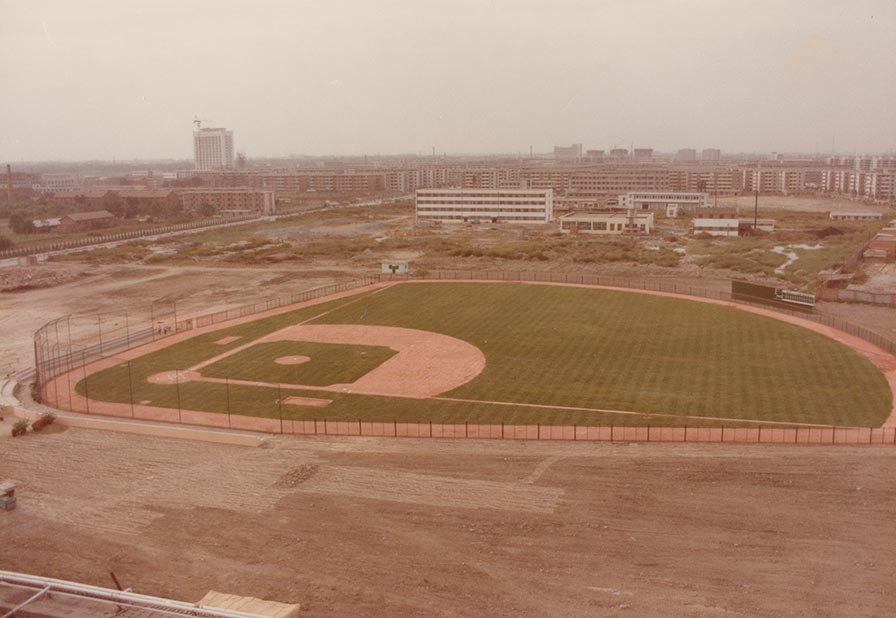
Dodger Baseball Field was privately built by Dodger President Peter O’Malley at Tianjin Institute of Physical Culture, Tianjin, People’s Republic of China. The baseball field officially opened September 12, 1986 and was used for decades by professional, college and amateur teams.
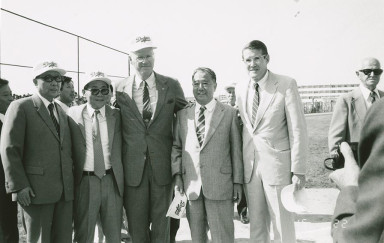
(L-R): Ji-Qui Chen, President of Tianjin Institute of Physical Culture; Li Ruihuan, mayor of Tianjin; former Baseball Commissioner Bowie Kuhn; Li Menghua, Minister of Sports, People’s Republic of China; Dodger President Peter O’Malley; and Harry Bardt, Director, Dodger Board of Directors. At Dodger Baseball Field which is being dedicated during Opening Ceremonies on September 12, 1986 at Tianjin Institute of Physical Culture, TIanjin, People’s Republic of China.
There were smiles all around as the principals lined up for photos behind home plate, wearing white caps provided by O’Malley embroidered with blue script “Dodgers.” Jia-Qi Chen, president of Tianjin Institute, could not have been prouder. On the field, O’Malley shook hands with and greeted the local umpires. Li Menghua, president of the All-China Sports Federation and president of the Chinese Olympic Committee, presided at the ceremonies. Li Ruihuan, who held the important position of mayor of Tianjin, was there at the grand opening as well as for receptions. Ruihuan would serve as Tianjin mayor from 1982-1989 and then became one of the country’s leaders from the Chinese Communist Party Political Bureau’s Standing Committee at the Great Hall of The People in Beijing. He was part of China’s powerful decision-making body from 1989-2002.
O’Malley had invited friends and dignitaries from around the world to participate in the festivities including Dr. Bob Smith, president of the International Baseball Association (IBA); Kuhn; Dedeaux; Dr. Matsumae; Dr. Creighton Hale, president of Little League Baseball; Ikuo Ikeda, publisher of Baseball Magazine Sha in Tokyo; Senichi Hoshino, Japan Hall of Fame pitcher for the Chunichi Dragons and television commentator; Renzo Ishii, longtime head baseball coach at prestigious Waseda University, Tokyo who was posthumously inducted into the Japan Baseball Hall of Fame in 2020; Eiichiro Yamamoto from Japan, who had been Vice President of the Baseball Federation of Asia since 1981, and 1st Vice President of the IBA; and Masanori Ochi, columnist, The Evening Fuji and TV baseball analyst.
Of course, as he had been for nearly every international exchange and important meeting, Assistant to the President Ikuhara was by O’Malley’s side. The highly-respected Ikuhara was an interpreter for interviews with media from Japan and quietly, behind-the-scenes, helping to renew friendships and establish relationships. Longtime Bank of America executive Harry Bardt, a long-term member of the Dodgers Board of Directors, who had played baseball in China as a U.S. Army soldier in 1917, was also on the trip. So was O’Malley’s wife Annette, who had traveled with her husband during his initial visit to China in 1980, and returned with him for several trips.
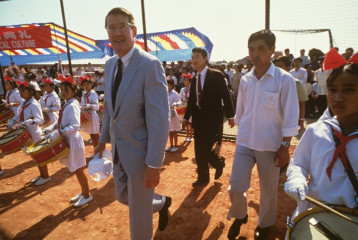
Dodger President Peter O’Malley soaks up the exciting atmosphere at Dodger Baseball Field which he privately built at Tianjin Institute of Physical Culture Education in Tianjin, People’s Republic of China. Dedication ceremonies are about to begin on September 12, 1986.
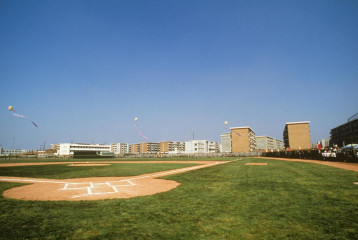
New Dodger Baseball Field is ready for its close-up, as Dodger President Peter O’Malley privately built the first field exclusively used for baseball in the People’s Republic of China, opened September 12, 1986. It is located at Tianjin Institute of Physical Culture, Tianjin, People’s Republic of China.
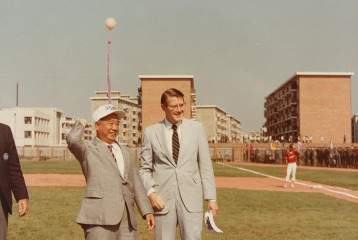
September 12, 1986, Li Menghua, Minister of Sports, People’s Republic of China, prepares to throw the ceremonial first pitch during Grand Opening ceremonies at Dodger Baseball Field privately built by Dodger President Peter O’Malley (standing next to him) at Tianjin Institute of Physical and Cultural Education, Tianjin, People’s Republic of China.
The Philadelphia Inquirer reported Li Menghua, the Minister of Sports in the People’s Republic of China, threw the ceremonial first ball and deeming the first pitch too low, threw a second “first pitch”! Philadelphia Inquirer, September 12, 1986
Upon dedicating the competition-sized grass field, O’Malley addressed the crowd, “The field is more beautiful than I imagined and I am grateful to the faculty and students for their contribution. The field is yours! My wish to the players is that they enjoy playing baseball here for many years. My wish to the spectators is that this field gives you many hours of entertainment. It is now my dream that this Dodger Baseball Field will enhance both the growth of baseball here and the friendship between the United States and the People’s Republic of China.”
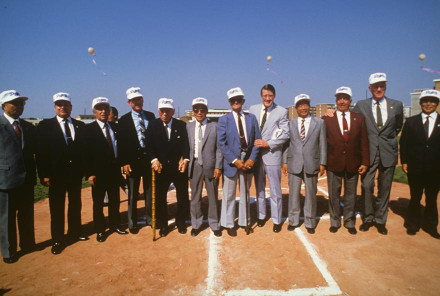
Dedication ceremonies for Tianjin Field, Tianjin, People’s Republic of China. (L-R): Unidentified; Dr. Creigton Hale, President, Little League Baseball; Eiichiro Yamamoto of Japan and Vice President, Baseball Federation of Asia; Dr. Bob Smith, President, International Baseball Federation; Dr. Shigeyoshi Matsumae, Founder and President, Tokai University; Li Ruihuan, mayor of Tianjin; Harry Bardt, member, Dodger Board of Directors; Dodger President Peter O’Malley; Li Menghua, Minister of All-China Sports, People’s Republic of China; Rod Dedeaux, USC head baseball coach; Bowie Kuhn, former Baseball Commissioner; Unidentified.
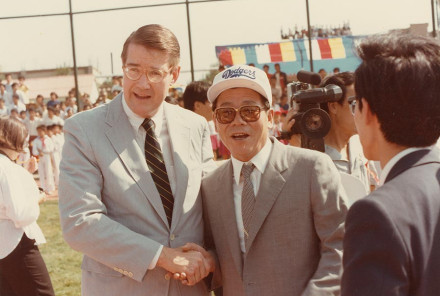
Dodger President Peter O’Malley greets Li Ruihuan, mayor of Tianjin, People’s Republic of China at Grand Opening ceremonies for Dodger Baseball Field at Tianjin Institute of Physical Culture on September 12, 1986. China’s first field exclusively for baseball was built by O’Malley. Ruihuan later became one of the country’s elite leaders from the Chinese Communist Party Political Bureau’s Standing Committee at the Great Hall of the People in Beijing. Li has been a prominent member of a significant government board for the People’s Republic of China. He was mayor of Tianjin from 1982-1989.
O’Malley recalled another benefit of the field’s opening, “I had dinner with Dr. Matsumae in China during the opening of our baseball complex and he said he long had a dream of building a stadium in the Soviet Union. I thought that would be extraordinary and would really encourage the Russian people…It makes me proud. I’ll be there for the opening.” Randall Mell, Ft. Lauderdale Sun-Sentinel, July 1, 1989
IBA President Dr. (Robert) Smith said, “Dr. Matsumae went to mainland China for the dedication of a stadium that Peter O’Malley helped the Chinese build. It was there that Dr. Matsumae was inspired to do the same thing with the Soviet Union to help improve international relations.” Frank Carroll, Ft. Lauderdale Sun-Sentinel, August 24, 1989 Dr. Matsumae just happened to be good friends with the president of Moscow State University, known as the campus on Lenin Hills.
O’Malley said of Dr. Matsumae, “He hoped international peace would come through the globalization of baseball.”
In Dr. Matsumae’s 1988 book, “The Life and Struggles of a Fighter for Peace,” he wrote, “The establishment of world peace through sporting competitions between the four countries, Japan, America, China and the Soviet Union, was the goal…‘Before now,’ O’Malley said in a speech at the opening ceremony, ‘we had never thought of constructing a baseball stadium overseas and that adds to the pleasure I feel on this occasion.’ This is the start of sports friendship between the three nations of Japan, America and China. Next year, when the stand (stadium in Moscow) is completed, we plan to begin by holding the Asia Baseball Championship Tournament and, in the future, a World Baseball Championship with the motto, ‘For the Establishment of World Peace through Sport.’” The Life and Struggles of a Fighter for Peace, Dr. Shigeyoshi Matsumae (English translated version by Hisaya Shirai), 1988
On April 17, 1988, during a several days goodwill visit to Russia, O’Malley and Ikuhara attend the Groundbreaking Ceremony for Matsumae Baseball Stadium at Moscow State University, a $3.2 million project donated by Dr. Matsumae. It would be the first baseball-only stadium (capacity 1,500) built in the Soviet Union. O’Malley and Ikuhara traveled from the United States and were joined by Dr. Smith, who for years worked tirelessly with O’Malley, Kuhn, Dedeaux and other worldwide leaders to advocate baseball as a gold medal sport in the Olympic Games. Coach Dedeaux, who won 11 College World Series titles, also attended in support of the new baseball field.
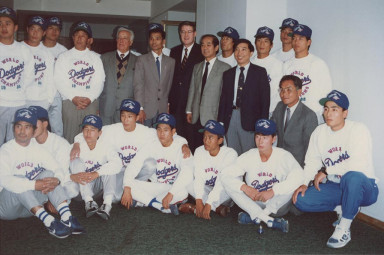
September 1, 1989, Moscow State University, Russia, Peter O’Malley (center back row) greets members of the Tianjin Baseball Team from the People’s Republic of China who were playing in the inaugural tournament opening Matsumae Baseball Stadium. Coach Rod Dedeaux of USC is standing fifth from left. Baiqing Sun, Deputy Secretary-General, Baseball Association, People’s Republic of China is standing fourth from right, and Akihiro “Ike” Ikuhara, Assistant to O’Malley, is kneeling second from right.
O’Malley and Ikuhara returned to Russia as Dr. Matsumae’s guests to attend the September 1, 1989 inauguration ceremonies for Matsumae Baseball Stadium at Moscow State University. Again, O’Malley and Ikuhara were joined by frequent traveling partner and international baseball devotee Dedeaux. A four-team international tournament was hosted by Moscow State University along with teams from China’s Tianjin Institute; University of Miami Hurricanes; and Japan’s Tokai University. The script was just as Dr. Matsumae, who threw the ceremonial first pitch, had envisioned years before.
At the opening of Matsumae Stadium, O’Malley said of builder Dr. Matsumae, “He’s a legend. I’m really impressed with the quality of the stadium. The design is excellent.” Randall Mell, Ft. Lauderdale Sun-Sentinel, September 1, 1989
In a 2003 interview, O’Malley said, “Baseball has an extraordinary opportunity to generate goodwill and understanding. A good friend of mine in Japan, Dr. Matsumae, founder of Tokai University, had a dream to build a baseball stadium in Moscow because he believed that if baseball could get started in Russia that would help the United States, Russia and Japan…It all helps because we all have to get along.” Kelly Candaele, irishAmerica.com, October/November, 2003
As for Dodger Baseball Field in Tianjin, it was put to great use for decades and became the hub of China baseball activity. It was used for practices, instruction, amateur events, games and tournaments. In his 1992 book, “Is the Moon in China Just as Round?”, Dr. Jonathan Kolatch writes, “Then we headed out to Peter’s field – first for a little catch, and then for a briefing by Coach Liu (Gang) on the ‘Tianjin Institute of Physical Education Dragon Baseball Training System.’ The system consists of the dragon’s tail (the ages 9 to 11 children’s team); the dragon’s belly – lower (the 12 to 15 youth teams); the dragon’s belly – upper (the 16 to 19 junior team); and the dragon’s head (the adult team)…This is one of the few programs in any sport in China where all levels are trained at one site.” Dr. Jonathan Kolatch, “Is the Moon in China Just as Round?”, 1992, Jonathan David Publishers, Inc., Peter O’Malley chapter, Pages 53-56
The field was eventually home to the Tianjin Lions, one of the original four teams of the professional China Baseball League, which existed from 2002-2018. The Lions won six championships (2002, 2006, 2007, 2008, 2011 and 2016), the most in the CBL.
Dr. Smith, former president of the IBA, said, “It (Tianjin Field) became the first major facility of any sort in China. It became the centerpiece, a place where they developed their teams.” Brian Bixler, Indian River Press Journal, February 26, 1988
“Longtime Dodgers owner Peter O’Malley was baseball’s pioneer in China,” wrote longtime Asian baseball historian Joseph Reaves. “In the mid-1980s, just as China was opening to the outside world, O’Malley…paid for construction of a baseball stadium in the port city of Tianjin, 75 miles southeast of the capital. Dodger Stadium – as it is called today – is home to the Tianjin Lions of the Chinese Baseball League, a Japanese-sponsored professional league founded in 2002.” Joseph Reaves, Arizona Republic, January 28, 2007

Mini bats are collectibles and designed to commemorate special events as well as friendship. Dodger President Peter O’Malley’s mini bat from the July 4, 1990 dedication ceremony of the Little League Baseball Friendship Field sponsored by Mitsui in Guangzhou, Guangdong Province, People’s Republic of China. It was the first-ever Little League field built in China and still active today.
On October 1, 1986, O’Malley invited a Chinese junior baseball team to play at Dodger Stadium, marking the first time a baseball team from People’s Republic of China visited the United States. O’Malley and Tatsuzo Mizukami, past Chairman of Mitsui & Co, Ltd., a Japan-based company, served as Trustees of the Little League Baseball Foundation. They frequently talked about international baseball and Mizukami was interested in the baseball field that O’Malley had privately built in Tianjin in 1986. That sparked an idea for Mizukami that he would like to do something for youth baseball in China. O’Malley suggested Guangzhou, Guangdong Province, as it is the Sister City of Los Angeles. O’Malley is a member of the Los Angeles-Guangzhou Sister City Association Board of Directors. Through Mitsui, Mizukami sponsored and developed the first-ever Little League Baseball field in the People’s Republic of China. In 1990, O’Malley traveled to Guangzhou, China to participate in July 4 dedication ceremonies in support of Little League Baseball Friendship Field at the Tianhe Sports Center. He and Little League Baseball President Dr. Creighton Hale frequently traveled to many countries in support of encouraging Little League. O’Malley served as a Trustee of Little League Baseball Foundation for 31 years, including 11 as president.
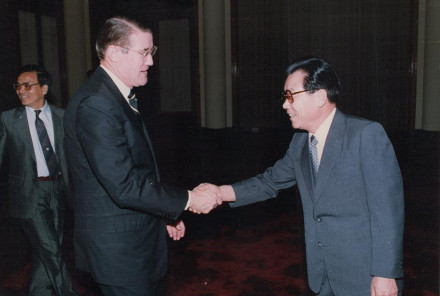
On July 6, 1990, Peter O’Malley visits the Great Hall of the People in Beijing, People’s Republic of China and is invited to meet with Li Ruihuan, member of the six-member Standing Committee of the Politburo and the former mayor of Tianjin, China.
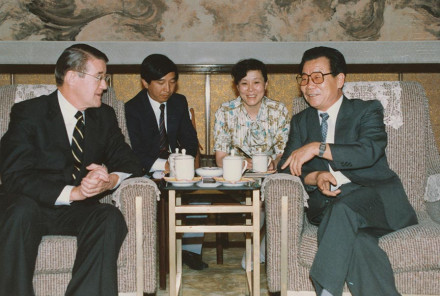
July 6, 1990, Great Hall of the People, Beijing, People’s Republic of China (L-R): Dodger President Peter O’Malley; Baiqing Sun, Deputy Secretary General, Baseball Association of the People’s Republic of China and interpreter; Liu Beijian, interpreter; Li Ruihuan, member of the six-member Standing Committee of the Politburo, former mayor of Tianjin. Li has been a prominent member of a significant government board for the People’s Republic of China. He was mayor of Tianjin from 1982-1989 and participated in the dedication of Tianjin’s “Dodger Baseball Field”, the country’s first field dedicated to baseball, in 1986.
While in China on that trip, O’Malley was invited to Beijing on July 6 to the Great Hall of the People, along with assistant Akihiro “Ike” Ikuhara, to meet with Li Ruihuan, a member of the six-member Standing Committee of the Politburo in the People’s Republic of China and former longtime mayor of Tianjin. Ruihuan was part of the dedication ceremonies for Dodger Baseball Field in Tianjin in 1986 and hosted a celebratory reception. He later became one of China’s highest-ranking government officials. Also part of the meeting on July 6 with Ruihuan were Wu Qinzhang, Director, Institute Committee of Tianjin Institute of Physical Education; Wu Shaozu, Minister of Sports; Wei Ming, President of Chinese Baseball Association; and Yu Zaiqing, Deputy Director General Liaison Department, 1990 Beijing XI Asian Games Organizing Committee.
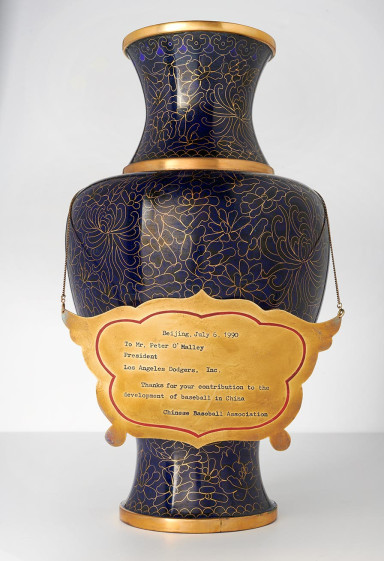
Dodger President Peter O’Malley made a historic visit to Beijing, People’s Republic of China on July 6, 1990 where he was invited to the Great Hall of The People to meet with Li Ruihuan, a member of the six-member Standing Committee of the Politburo in China. Ruihuan was part of the dedication ceremonies for Dodger Baseball Field, privately built by O’Malley, in TIanjin in 1986 when he was then the longtime mayor of Tianjin. O’Malley met with several high-ranking government and sports officials during his visit. The Chinese Baseball Association presented this special vase and plaque to O’Malley for his contributions to the development of baseball in China.
On July 6, 1990, O’Malley received a large vase with a plaque hanging from it which was engraved: “To Mr. Peter O’Malley, President, Los Angeles Dodgers, Thanks for your contribution to the development of baseball in China, China Baseball Association”.
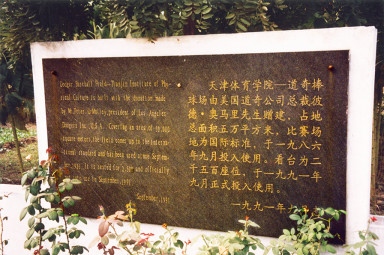
A granite marker at the Tianjin Institute of Physical Culture, Tianjin, People’s Republic of China to identify Dodger Baseball Field privately built by Dodger President Peter O’Malley. The baseball park opened in September 12, 1986.
Five years after O’Malley established “Dodger Baseball Field,” a large granite marker was dedicated at Tianjin Institute. Permanent seating was added at that time to the baseball field. The marker’s bilingual inscription: “Dodger Baseball Field – Tianjin Institute of Physical Culture is built with the donation made by Mr. Peter O’Malley, president of Los Angeles Dodgers Inc., U.S.A. Covering an area of 50,000 square meters, the field comes up to the international standard and has been used since September, 1986. It is seated for 2,500 and officially put into use in September, 1991.”
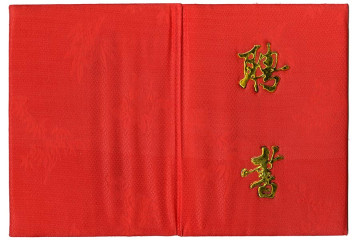
On September 12, 1991, The People’s Government of Tianjin bestowed a rare honor at the time, naming Peter O’Malley an “Honorary Citizen” with a scroll stating, “It is a great honor to Confer the title ‘Honorary Citizen of Tianjin of the People’s Republic of China’ on Mr. O’Malley, president of Los Angeles Dodgers, Inc. U.S.A.”
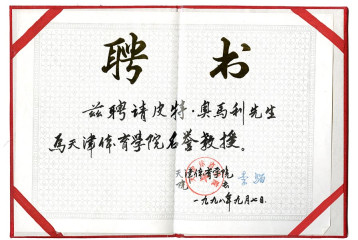
On September 12, 1991, The People’s Government of Tianjin bestowed a rare honor at the time, naming Peter O’Malley an “Honorary Citizen” with a scroll stating, “It is a great honor to Confer the title ‘Honorary Citizen of Tianjin of the People’s Republic of China’ on Mr. O’Malley, president of Los Angeles Dodgers, Inc. U.S.A.”
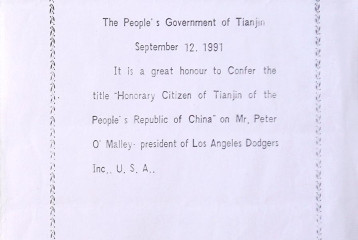
On September 12, 1991, The People’s Government of Tianjin bestowed a rare honor at the time, naming Peter O’Malley an “Honorary Citizen” with a scroll stating, “It is a great honor to Confer the title ‘Honorary Citizen of Tianjin of the People’s Republic of China’ on Mr. O’Malley, president of Los Angeles Dodgers, Inc. U.S.A.”
On September 12, 1991, The People’s Government of Tianjin named O’Malley an “Honorary Citizen” with a scroll stating, “It is a great honor to Confer the title ‘Honorary Citizen of Tianjin of the People’s Republic of China’ on Mr. Peter O’Malley, president of Los Angeles Dodgers, Inc. U.S.A.”
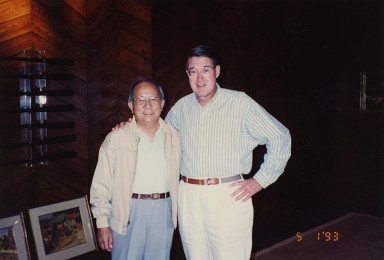
On May 1, 1993, Dodger President Peter O’Malley meets with Youde Liang, Vice President, Baseball Association of the People’s Republic of China at O’Malley’s Dodger Stadium office.
The Dodgers aired the first radio broadcast in Mandarin Chinese on May 19, 1993 at Dodger Stadium. It was also the first Major League Baseball regular season game broadcast in four languages – Mandarin Chinese, English, Spanish and Korean. O’Malley’s friend Youde Liang, Vice President of the Baseball Association of the People’s Republic of China, sat with O’Malley for the game.
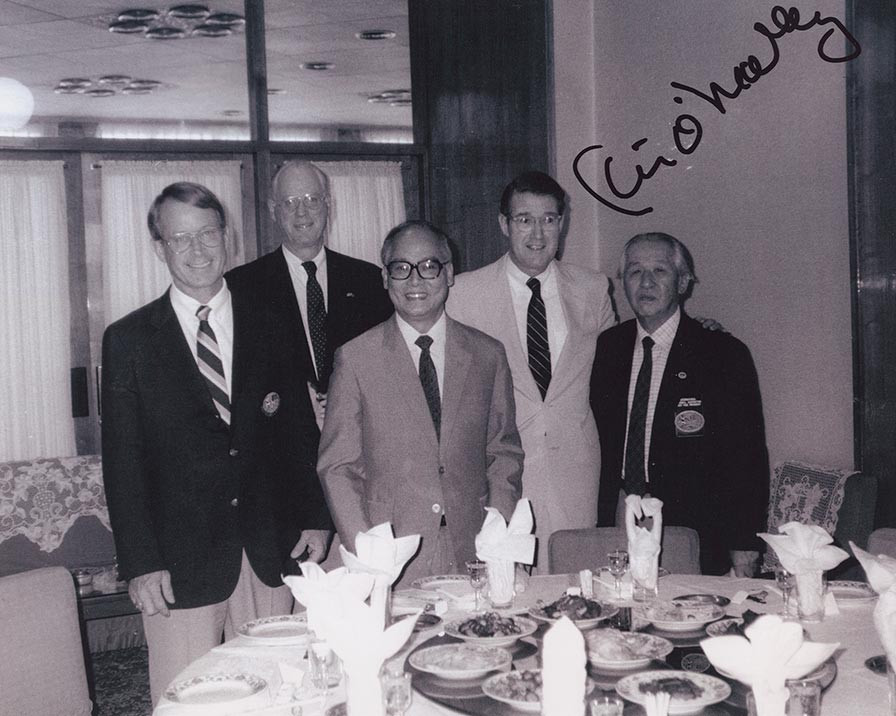
(L-R): Dr. Bob Smith, President, International Baseball Association (IBA); former Baseball Commissioner Bowie Kuhn; He Zhenliang, Vice President, International Olympic Committee (1989-1993) from the People’s Republic of China; Dodger President Peter O’Malley; and Eiichiro Yamamoto, 1st Vice President of IBA. O’Malley traveled to Beijing from June 25-29, 1994 to encourage Little League Baseball in China. He Zhenliang, President of the Chinese Olympic Committee, held a meeting with the delegation to support growing youth baseball programs.
In June, 1994, O’Malley, former Baseball Commissioner Kuhn, Dr. Hale and others met with one of China’s most influential and top government officials He Zhenliang, Vice President of the International Olympic Committee (1989-1993) and President of the Chinese Olympic Committee (1989-1994). The meeting was to encourage the support of Little League Baseball.
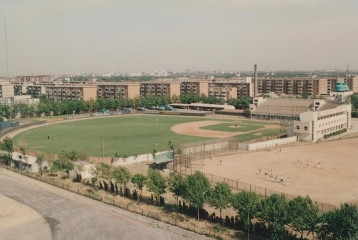
Dodger Baseball Field at Tianjin Institute of Physical Culture, Tianjin, People’s Republic of China, as it appeared in 1994. Permanent grandstands were added after the field, privately built by Dodger President Peter O’Malley, opened on September 12, 1986. The field was used for decades for professional, college and amateur baseball games.
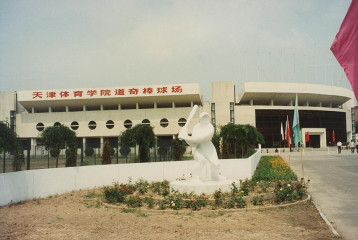
As it appeared on June 27, 1994, Dodger Baseball Field at Tianjin Institute of Physical Culture, privately built by Dodger President Peter O’Malley.
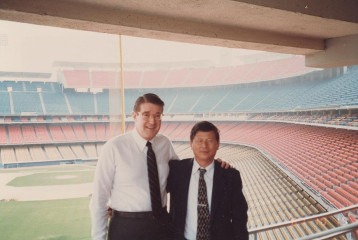
Circa 1990s, Dodger Stadium, Dodger President Peter O’Malley and Cai Jizhou, Vice President, Chinese Baseball Association, People’s Republic of China. Cai was most helpful to O’Malley while searching for sites to privately build the first dedicated field to baseball in the People’s Republic of China.
In a joyous moment for international baseball leaders, the IOC announced on October 13, 1986 baseball would become an official part of the Olympic Games for the 1992 Barcelona Olympics. Baseball was also included in the Olympics in 1996 Atlanta, 2000 Sydney, 2004 Athens, 2008 Beijing, and 2020 Tokyo.
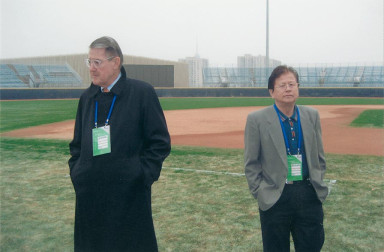
(L-R): Peter O’Malley and Cai Jizhou, retired Vice President, Chinese Baseball Association, as they view Olympic Baseball Stadium, Beijing, China, March 28, 2008.
In March, 2008, O’Malley was invited to see the new baseball field created for the 2008 Beijing Olympics that summer. He got a first-hand tour of Wukesong Baseball Field and met with Secretary General, Chinese Baseball Association Madame Shen Wei; Deputy Competition Manager, Baseball, Beijing Olympics and former Secretary of the Chinese Baseball Association Xuan (Susan) Zhang; Competition Manager, Baseball, Beijing Olympics & VP Chinese Baseball Association Gaochao (Walter) Li; and retired VP, Chinese Baseball Association Cai Jizhou. South Korea won the gold medal in the Beijing 2008 Olympics.
However, by 2012 in London and 2016 in Rio de Janeiro, baseball was not on the Olympic program. A worldwide pandemic delayed baseball’s return to Tokyo 2020, but Team Japan won the gold medal – its first in baseball – over the USA in the championship game on August 7, 2021. After a pause in Paris in 2024, baseball will return to the 2028 Olympic program in Los Angeles.
In 2013, O’Malley said, “Baseball in China was in its infancy at that time and would have flourished if baseball had continued to be an official Olympic sport. Today the future of baseball in China is problematic.” Akihiro “Ike” Ikuhara biography, Nobuhisa Ikuhara, 2013
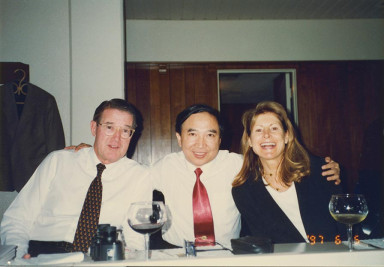
On June 4, 1997, Peter O’Malley and his wife Annette welcome Baiqing Sun, Deputy Secretary General, Baseball Association of the People’s Republic of China (center) to the Chairman’s Box at Dodger Stadium, Los Angeles.
In his November 3, 1997 New York Times’ article about O’Malley attending a speech by the President of the People’s Republic of China Jiang Zemin in Beverly Hills, CA, writer Todd S. Purdum states, “Mr. O’Malley, who built a baseball field for a school in Tianjin, near Beijing, a decade ago, has sponsored coaching and sports medicine exchanges between Chinese baseball clubs and their counterparts on the Dodgers. He ultimately hopes to build a baseball academy in China, where baseball is just beginning to become popular.” O’Malley said, “Sports can do so much. Baseball can bring people together. My dream is to someday see a Dodger from the People’s Republic.” Todd S. Purdum, New York Times, December 3, 1997
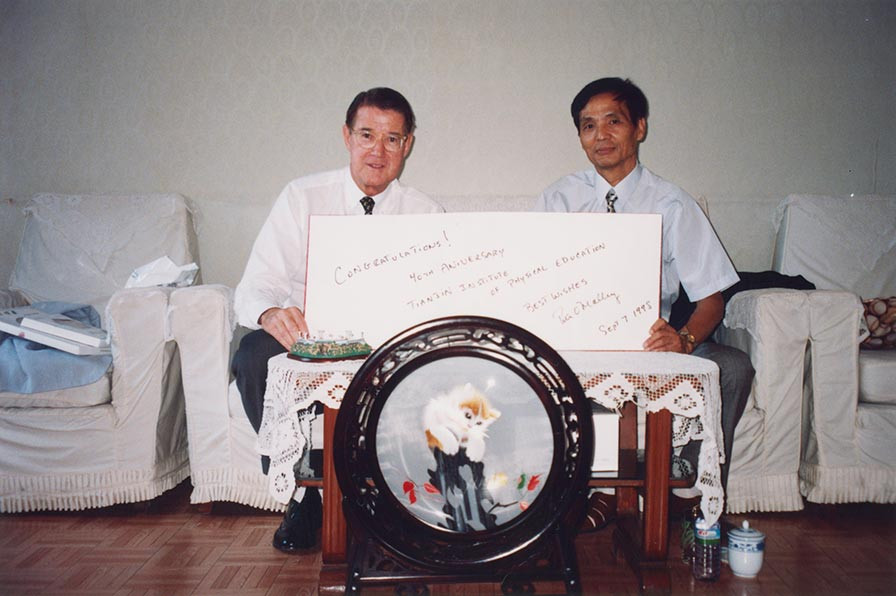
On September 7, 1998, Peter O’Malley (left) returns to Tianjin Institute of Physical Culture and presents a large congratulatory card for the 40th Anniversary of Tianjin Institute to its President Li Liu (right). O’Malley privately built Dodger Baseball Field at Tianjin Institute which opened on September 12, 1986.
In September, 1998, O’Malley visited newly-named Tianjin Institute of Physical Education for the 40th Anniversary celebration, to return to the baseball field he built and present gifts to the Institute on its special milestone.
Amateur teams gathered at Dodger Baseball Field for the inaugural 1999 O’Malley Cup International Baseball Invitational Tournament from August 5-10. The five competing teams were the American Amateur Baseball Team, Tianjin Fu Jen Catholic University, Chinese National Baseball Team, Tianjin Dong Ge Baseball Team and the Baseball Team of Tianjin Institute of Physical Education. O’Malley wrote, “You and all my good friends at the Tianjin Institute of Physical Education have my very best wishes for the upcoming baseball tournament featuring the O’Malley Cup. I am very happy to have my family name identified with this international goodwill event.”
For nearly 30 years, the field certainly fulfilled O’Malley’s mission to assist in the development of baseball in China, support the goal of players in China to perform in the major leagues, and bring about friendships throughout the world.


